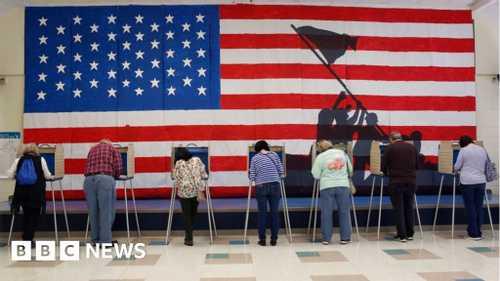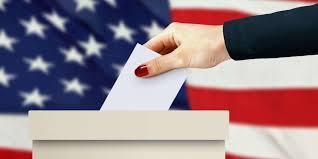All you need to know about US election
Curated from: bbc.com
Ideas, facts & insights covering these topics:
7 ideas
·663 reads
4
Explore the World's Best Ideas
Join today and uncover 100+ curated journeys from 50+ topics. Unlock access to our mobile app with extensive features.
The main parties
In the US, there are only two parties considered by most voters - the Democrats (the liberal party) and the Republicans (the conservative party).
Others, like the Libertarian, Green and Independent parties occasionally put forth a nominee.
22
159 reads
The present
At present, presidential hopefuls are battling for their party's nomination in caucuses and primary elections across the country.
State governments run primary elections the same way as a general election.
If a candidate wins a primary election, they win either all or a proportion of the state's delegates. These delegates will then vote for them at the party convention, where the presidential nominee is named.
21
105 reads
Caucuses
A handful of states have caucuses instead of primaries. The parties run caucuses in precincts across the state.
Caucuses give parties more flexibility in determining the rules. In Democratic caucuses, votes are determined by standing in groups around a room.
20
87 reads
Presidential campaigns 2020
- Four states voted in February.
- Most states and territories hold their primary elections or caucuses on 3 March (Super Tuesday.)
- We'll see primaries and caucuses across the country from February until June.
- US candidates can campaign for as long as they wish, so presidential campaigns typically last about 18 months from start to finish.
- The Democratic National Convention, where the party will name its nominees for president and vice-president, will be held from 13 July to 16 July.
- The Republican National Convention happens between 24 August and 27 August.
- After that, four debates will take place with President Trump or Vice-President Mike Pence along with their Democratic challengers.
20
68 reads
Winning the general election
- The sheer number of votes received by each candidate will not determine the winning of the 3 November general election.
- It goes down to the Electoral College - officials or "electors" who vote on behalf of the states for president. Each state is worth several electors proportionate to its representation in Congress. This system gives greater weight to smaller states.
- Once a new winner is announced, there will be a brief transition period that will allow a new president to select cabinet members and make plans. Inauguration takes place on 20 January.
20
66 reads
Swing, red and blue states
- Red states are Republican bastions such as Idaho, Alaska, and many southern states.
- Blue states are Democrat-dominated states such as California, Illinois, and much of the New England region of the northeast coast.
- Swing states are states that can change hands depending on the candidate.
22
102 reads
Casting ballots
- Most states offer early voting, allowing registered voters to cast their ballots ahead of Election Day (3 November).
- Voters who are unable to go to a polling place may use a mail-in absentee voting.
- On Election Day, voters have to go in-person to an official polling place.
- There is no online voting.
21
76 reads
IDEAS CURATED BY
"If you want to build a ship, don’t drum up the men to gather wood, divide the work and give orders. Instead, teach them to yearn for the vast and endless sea." - The little Prince
Similar ideas
10 ideas
10 of the most bizarre elections in American history
edition.cnn.com
Read & Learn
20x Faster
without
deepstash
with
deepstash
with
deepstash
Personalized microlearning
—
100+ Learning Journeys
—
Access to 200,000+ ideas
—
Access to the mobile app
—
Unlimited idea saving
—
—
Unlimited history
—
—
Unlimited listening to ideas
—
—
Downloading & offline access
—
—
Supercharge your mind with one idea per day
Enter your email and spend 1 minute every day to learn something new.
I agree to receive email updates

